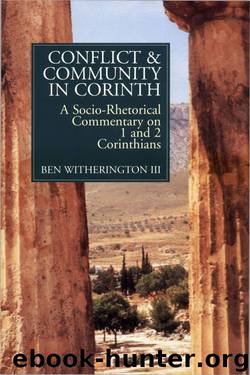Conflict and Community in Corinth: Socio-rhetorical Commentary on 1 and 2 Corinthians by Witherington Ben

Author:Witherington, Ben [Witherington, Ben]
Language: eng
Format: epub
Tags: A Socio-Rhetorical Commentary on 1 and 2 Corinthians
Publisher: Eerdmans Publishing Co - A
Published: 1995-01-24T00:00:00+00:00
Argument VI: 11:17-34
MAKING A MEAL OF IT
This section continues the discussion of abuses in worship that began in 11:2 and continues through ch. 14. Since Paul is correcting abuses he does not provide a full positive exposition of his views of the Lord's Supper here. Nonetheless, we learn a great deal here about how the Lord's Supper was being practiced in Corinth and about Paul's views of the Supper.
To this point in Paul's discourse we have seen a variety of factors at work in the divisions among the Corinthian Christians. There were divisions over teachers centered on the matter of wisdom both in the sense of rhetoric and the sense of sapiential content, over legal matters, over marriage, divorce, and singleness, and over whether to attend idol feasts. Here we hear of divisions coming out in an act of Christian worship, that is, in an agape meal that was the context for sharing in the Lord's Supper. These divisions seem to have been created by some more well-to-do members of the congregation treating the agape meal like a private dinner party, perhaps a banquet followed by a drinking party (convivium). The result of this was that the social stratification of the congregation was overemphasized and exacerbated. A serious division between haves and have-nots was thus threatening the fragile unity of the Corinthian Christian community.1
Paul is concerned with at least two social facets of the problem, namely, the disorderliness and inequality of the proceedings.2 Neither of these characteristics was at all unusual at Greco-Roman banquets followed by drinking parties. Even the larger dining rooms in homes were equipped to hold only nine to twenty people, and there were certainly more Corinthian Christians than that. It was the normal practice to rank one's guests in terms of social status, with those of higher status eating with the host in the dining room and others eating elsewhere and getting poorer food. The only exception to this rule was during the Saturnalia, when normal social values were turned upside down for a day and slaves and poor people were treated well. Lucian describes the Saturnalia, contrasting it with the normal practice of a Greco-Roman banquet (Sat. 2If.):
Download
This site does not store any files on its server. We only index and link to content provided by other sites. Please contact the content providers to delete copyright contents if any and email us, we'll remove relevant links or contents immediately.
Cecilia; Or, Memoirs of an Heiress — Volume 1 by Fanny Burney(32530)
Cecilia; Or, Memoirs of an Heiress — Volume 2 by Fanny Burney(31929)
Cecilia; Or, Memoirs of an Heiress — Volume 3 by Fanny Burney(31919)
The Lost Art of Listening by Michael P. Nichols(7482)
Asking the Right Questions: A Guide to Critical Thinking by M. Neil Browne & Stuart M. Keeley(5742)
We Need to Talk by Celeste Headlee(5600)
On Writing A Memoir of the Craft by Stephen King(4921)
Dialogue by Robert McKee(4376)
Pre-Suasion: A Revolutionary Way to Influence and Persuade by Robert Cialdini(4198)
I Have Something to Say: Mastering the Art of Public Speaking in an Age of Disconnection by John Bowe(3866)
Elements of Style 2017 by Richard De A'Morelli(3335)
The Book of Human Emotions by Tiffany Watt Smith(3284)
Fluent Forever: How to Learn Any Language Fast and Never Forget It by Gabriel Wyner(3068)
Name Book, The: Over 10,000 Names--Their Meanings, Origins, and Spiritual Significance by Astoria Dorothy(2966)
Good Humor, Bad Taste: A Sociology of the Joke by Kuipers Giselinde(2935)
Why I Write by George Orwell(2935)
The Art Of Deception by Kevin Mitnick(2782)
The Grammaring Guide to English Grammar with Exercises by Péter Simon(2730)
Ancient Worlds by Michael Scott(2663)
